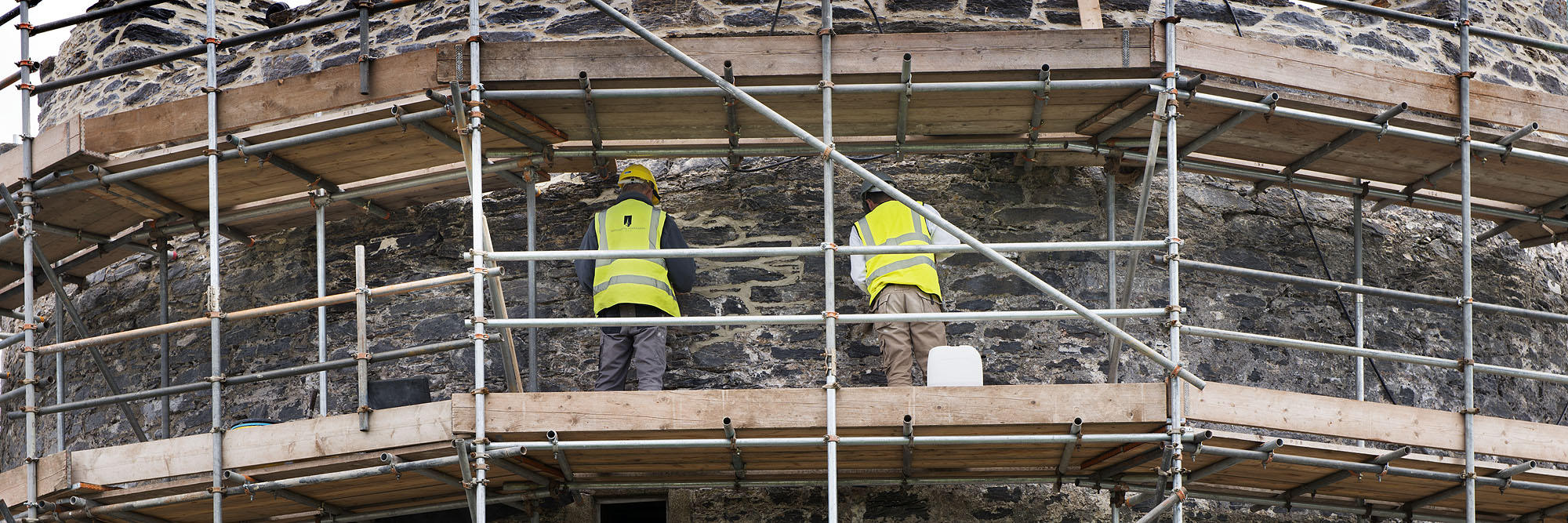Conservation Accreditation for Professionals
Working with older buildings requires specific skills and expertise. You can use accreditation to demonstrate your competence in these skills. Some grant schemes may also require you to hold accreditation.
Why is it important?
Conservation accreditation schemes are useful to clients, employers and grant funders because:
- To become accredited, professionals have to provide evidence of their knowledge, skills and experience
- Their registers can be used to find professionals with the skills you need
Further advice on finding the right professionals for your project is available on our Finding Professional Help page.
Conservation accreditation schemes
Professional bodies and independent organisations run the schemes. Each scheme has its own application and assessment process.
Most schemes use the International Council on Monuments and Sites' (ICOMOS) Guidelines for Education and Training in the Conservation of Monuments, Ensembles and Sites to assess a candidate's experience.
Conservation Accreditation schemes for professionals working on historic buildings include:
- Register of Architects Accredited in Building Conservation (AABC), operated by AABC Register Ltd
- Directory of Accredited Conservationists, operated by the Chartered Institute of Architectural Technologists
- Professional Accreditation of Conservator-Restorers (PACR) is a professional qualification administered by the Institute of Conservation
- Conservation Accreditation Register for Engineers (CARE), operated jointly by the Institution of Civil Engineers (ICE) and the Institution of Structural Engineers (IStructE)
- Conservation Accreditation System operated by the Royal Institute of the Architects of Ireland
- Accreditation in Conservation Architecture scheme operated by the Royal Incorporation of Architects in Scotland (RIAS)
- Conservation Register, operated by the Royal Institute of British Architects (RIBA)
- Building Conservation Accreditation Scheme, operated by the Royal Institution of Chartered Surveyors (RICS), for a range of professionals including chartered building surveyors and chartered quantity surveyors
- Building Conservation Certification Scheme operated by the Chartered Institute of Building, for roles including works supervisors, site managers, building and quantity surveyors, design coordinators and managers, project managers, construction managers, facilities managers and estates managers
There are also membership schemes for conservation professionals:
- The Institute of Historic Building Conservation (IHBC) covers building conservation practitioners and historic environment experts
- Chartered Institute for Archaeologists (CIfA) covers archaeologists
Learn more about the range of accreditation schemes available from the Understanding Conservation website.
UK home countries heritage bodies repair grant schemes
The main professional advisor on a repair grant scheme delivers a range of services, including:
- Analysis of condition
- Investigations
- Planning and specifying the work
- Inspecting and certifying the work in progress and after completion
You can find more details on these in the grant application information.
The main professional advisor must also have conservation accreditation. All the UK Home Countries Heritage Bodies below support this requirement:
- Department of Communities Northern Ireland
- Historic Environment Service (Cadw)
- Historic England
- Historic Environment Scotland
Find out how heritage bodies decide who can be recognised as the main professional advisor on their grant scheme.
Historic England's repair grants
Historic England's main grant scheme is Repair Grants for Heritage at Risk. The scheme is for those sites which are most in need of repair and where lack of funding is blocking progress.
The main professional advisor will usually be either an architect, chartered building surveyor or chartered architectural technologist. We currently accept conservation accreditation from:
- Architects listed on the AABC Register at category 'A', the RIAS Register at Accredited or Advanced level, or the RIBA Conservation Register at Specialist Conservation Architect level
- Chartered Architectural Technologists listed in the CIAT Directory of Accredited Conservationists at Accredited Conservationist level
- Chartered Building Surveyors listed on the RICS Building Conservation Accreditation Register or the CIOB Building Conservation Certification Scheme as Practitioners at Certified Level
In some cases, a Chartered Engineer, Chartered Landscape Architect or other historic landscape specialist will be the appropriate lead professional. For more information, please visit Our Grant Schemes web page or contact your local Historic England office for advice on your project.
Other grant schemes
On the War Memorials Trust's grant schemes, a conservation accredited lead professional is required for projects with a total project cost of over £10,000 in England, Northern Ireland and Wales, and £20,000 in Scotland.





